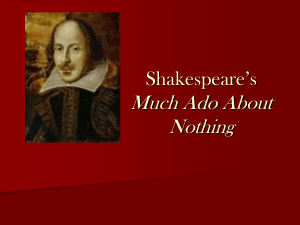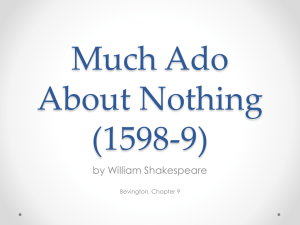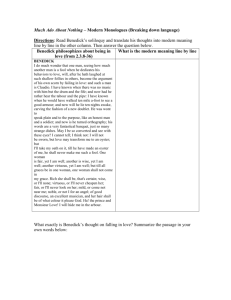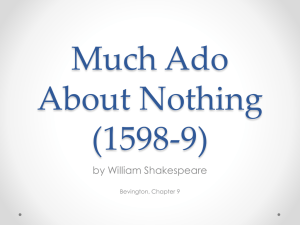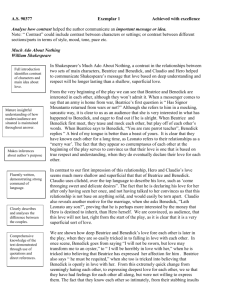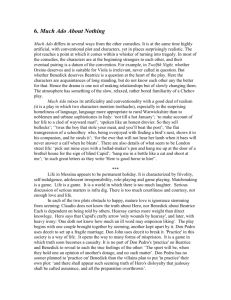ACT III:
advertisement
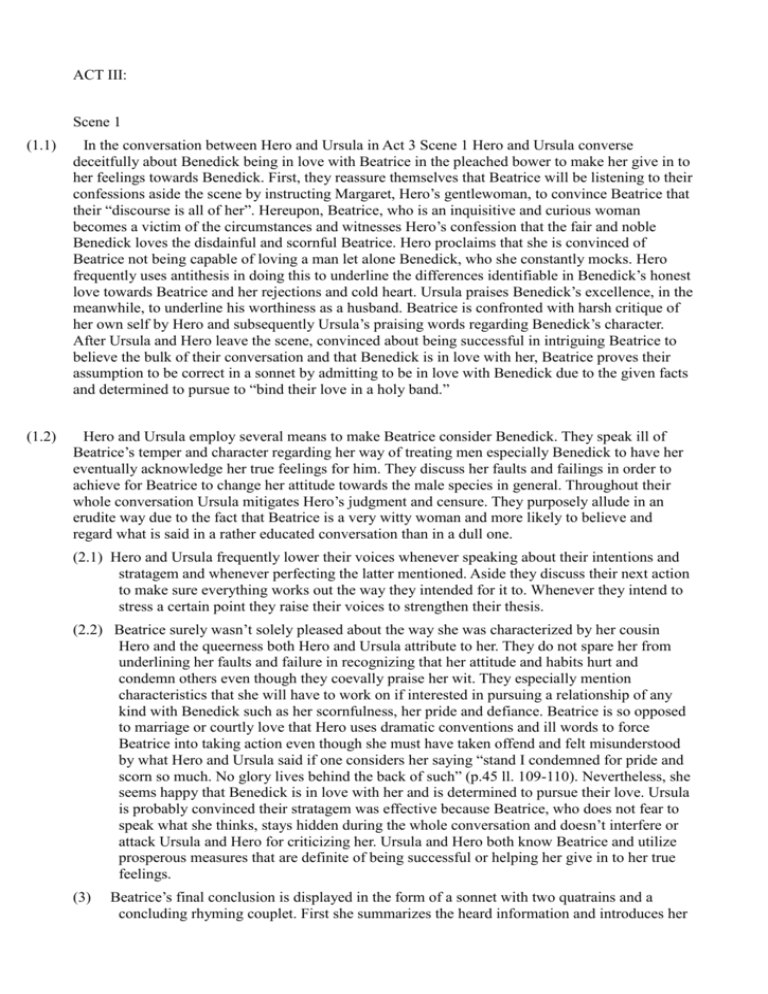
ACT III: Scene 1 (1.1) In the conversation between Hero and Ursula in Act 3 Scene 1 Hero and Ursula converse deceitfully about Benedick being in love with Beatrice in the pleached bower to make her give in to her feelings towards Benedick. First, they reassure themselves that Beatrice will be listening to their confessions aside the scene by instructing Margaret, Hero’s gentlewoman, to convince Beatrice that their “discourse is all of her”. Hereupon, Beatrice, who is an inquisitive and curious woman becomes a victim of the circumstances and witnesses Hero’s confession that the fair and noble Benedick loves the disdainful and scornful Beatrice. Hero proclaims that she is convinced of Beatrice not being capable of loving a man let alone Benedick, who she constantly mocks. Hero frequently uses antithesis in doing this to underline the differences identifiable in Benedick’s honest love towards Beatrice and her rejections and cold heart. Ursula praises Benedick’s excellence, in the meanwhile, to underline his worthiness as a husband. Beatrice is confronted with harsh critique of her own self by Hero and subsequently Ursula’s praising words regarding Benedick’s character. After Ursula and Hero leave the scene, convinced about being successful in intriguing Beatrice to believe the bulk of their conversation and that Benedick is in love with her, Beatrice proves their assumption to be correct in a sonnet by admitting to be in love with Benedick due to the given facts and determined to pursue to “bind their love in a holy band.” (1.2) Hero and Ursula employ several means to make Beatrice consider Benedick. They speak ill of Beatrice’s temper and character regarding her way of treating men especially Benedick to have her eventually acknowledge her true feelings for him. They discuss her faults and failings in order to achieve for Beatrice to change her attitude towards the male species in general. Throughout their whole conversation Ursula mitigates Hero’s judgment and censure. They purposely allude in an erudite way due to the fact that Beatrice is a very witty woman and more likely to believe and regard what is said in a rather educated conversation than in a dull one. (2.1) Hero and Ursula frequently lower their voices whenever speaking about their intentions and stratagem and whenever perfecting the latter mentioned. Aside they discuss their next action to make sure everything works out the way they intended for it to. Whenever they intend to stress a certain point they raise their voices to strengthen their thesis. (2.2) Beatrice surely wasn’t solely pleased about the way she was characterized by her cousin Hero and the queerness both Hero and Ursula attribute to her. They do not spare her from underlining her faults and failure in recognizing that her attitude and habits hurt and condemn others even though they coevally praise her wit. They especially mention characteristics that she will have to work on if interested in pursuing a relationship of any kind with Benedick such as her scornfulness, her pride and defiance. Beatrice is so opposed to marriage or courtly love that Hero uses dramatic conventions and ill words to force Beatrice into taking action even though she must have taken offend and felt misunderstood by what Hero and Ursula said if one considers her saying “stand I condemned for pride and scorn so much. No glory lives behind the back of such” (p.45 ll. 109-110). Nevertheless, she seems happy that Benedick is in love with her and is determined to pursue their love. Ursula is probably convinced their stratagem was effective because Beatrice, who does not fear to speak what she thinks, stays hidden during the whole conversation and doesn’t interfere or attack Ursula and Hero for criticizing her. Ursula and Hero both know Beatrice and utilize prosperous measures that are definite of being successful or helping her give in to her true feelings. (3) Beatrice’s final conclusion is displayed in the form of a sonnet with two quatrains and a concluding rhyming couplet. First she summarizes the heard information and introduces her standing point on the given. (Details about what presentation) Furthermore, she bids farewell to her own habits and is optimistic about a progressive and productive change in her life. The rhyming couplet proves of her determination to pursue a steady relationship with Benedick. Scene2: 1) A) What is different about Benedick? - Is in love (l.13, l.26) - Changed his style of clothing, nothing fits together anymore, looks like changing nationalities every day and within outfits (l.27f.) - shaven and therefore he looks younger (l.37f.) (cf Beatrice “Lord, I could not endure a husband with a beard on his face.”) - Smells differently (civet) (l.44f.) - Uses cosmetics/aftershave (l.48f.) - Not jesting anymore (l.51f.) B) How must he have been before? - full of happiness and jests (l.6 , l.51f.) - look older with a beard - used no cosmetics - dressed in a plain but suitable and coherent way - never thought to be able to love - interested in money and cold (maybe just a joke , l.16f.) 2) Claudio’s reaction to Don John: - directly wants to know what is wrong with not questioning the truth of Don John’s assault (l.80) - just asks according to Don John’s statements, as if he only wanted to confirm his clear understanding (l.91,94,103) - already takes Hero’s disloyalty into consideration and makes plans how to react (l.109f.) - already predicts the problem (l.118) - the general mistrust towards women is shown - shows how insecure Claudio is, because he is so easy to influence - shows another way of being naïve, by trusting a male simply because he is a male and not a female, the word of any male is still worth more than the word of the woman he loves Scene 3 (1) Dogberry’s malapropisms: They should have any allegiance in them (l.5); most desertless man (l.8); the most senseless and fit man (l.21); you shall comprehend all vagrom men (l.23); …to babble and to talk is most tolerable and not to be endured (l.34); the most peaceable way (l.55); you, constable, are to present the prince’s own person (l.68); weight chances (l.79); a great coil (l.86); be vigitant (l.87) What these words have in common: It is still possible to figure out what Dogberry really means: they either express the opposite, sound similar or at least fit to the topic. By choosing words that sound somewhat like the ones he needs, most of the time he ends up saying the exact opposite, thus creating puns unconsciously, in contrast to the higher classes of the stage society, who do this deliberately. (2) Dogberry’s orders: “comprehend all vagrom men” (l.23)= arrest all men that stay outside and “let him go” (l.27) if he can’t be held “meddle with none but the prince’s subjects” (l.32) “make no noise” (l.34) “bid those that are drunk to bed” (l.41) and “let them alone till they are sober” (l.44) “if you meet a thief you may suspect him” (l.48) and “let him show himself what he is” (l.56) “If you hear a child cry in the night, you must call the nurse” (l.61) or “let the child wake her with crying” (l.64) “offend no man” (l.75) “An there be any weight chances, call up me” (l.78) “watch about Signor Leonato’s door” (l.85) → orders how to behave well during the watch, how to deal with different people/situations, special order to pay attention to Leonato’s house What is the effect? → the watch can arrest the right men without being noticed before and after already having heard a full “confession” from them Due to this chaotic thinking, the watch end up with no duties whatsoever. The guidelines he tries to lay out for them render all his orders absurd. He does think logically but since he takes all things literally, he winds up without any results. Under the circumstances, it is surprising that his watchemen actually manage to arrest Conrade and Borachio. Scene 4 (1) Why Margaret’s role is considerably more noticeable in this scene: Margaret opposes Hero with negative comments about the wedding dress (e.g. l.6, l.12) Margaret talks negatively about Hero’s marriage in general (e.g. “[Your heart] will be heavier soon by the weight of a man”, l.25ff.) She makes allusions like “But God send everyone their heart’s desire” (l.55) → Margaret’s attitude towards the marriage differs from the one of Hero or Beatrice: negative, pessimistic and even malicious. It becomes obvious that she knows something that makes her look at it from a different light. Cf. parallels between Beatrice in the beginning and Margaret now Scene 5: Don John’s plot is almost revealed by Verges and Dogberry, but Leonato is too busy to listen, why is this scene included? - To emphasize the effect of what is happening, because it could have been avoided To hint to the blindness of people in some situations and to what such behavior can lead Show the arrogance of Leonato (upper class) being too “busy” listen to the constable - To point at the later happy ending, because the solution of the problem is only a matter of time - To educate the audience to a higher extent than the actors on stage, so they are more consumed by the performance because they wish to open the character’s eyes Review questions (1) Essential elements of the act Setting: court (orchard – Leonato’s house – open air – Hero’s apartment – the governor’s residence) Stage society: mostly nobles, almost only family members Language: on a personal level, but still formal Themes: love and marriage Atmosphere: personal, relaxed, most of the time harmonic Genre: rather comedic Exception: Scene 3+5 where Dogberry joins the scene: comedic and dramatic elements are added (Scene 3 is longest: dramatic centre of the act/whole play), colloquial language, more people join the stage society, action takes place outside of the court, atmosphere becomes tensioned Act abounds in dramatic contrasts and comic parallels; high comedy clashes with farce and melodramatic villainy (2) “Fashion”- References and their function In scene 2 Mocking about trends of fashion (l.27ff.); Benedick’s change of apparel → Benedick wants to express that he has changed (l.13); the others assume that he is in love (l.46) appearance vs reality; appearances can be deceptive (B. is in love but that does not make him a different man) In scene 4 Hero is dressing for her wedding (up to l.22) → she prepares for her role as a married woman Margaret criticises Hero’s dress (e.g. l.6, l.12) → she wants to demonstrate her power, shows indirectly that she is not sure of Hero’s new role (3) Why are Dogberry and his watch introduced in act III? Dogberry’s function: to discover the plot and therefore add to the dramatic aspect of the play → as Dogberry only takes part in solving the plot, it is not necessary to introduce him earlier. His sudden appearance that causes the turning point might even contribute to the play being exciting, as an unexpected option is provided. Cf. comic relief in Shakespearean tragedy (4) Why are Beatrice and Benedick shaken, confused and depressed? Both suddenly have to change their minds completely and against their “ideology” According to the image they have of the other one and to what has happened between them before, the conditions for a relationship do not seem too well Review questions: 1) Short summary - Scene 1: Beatrice is played on by Hero and Ursula so that she falls in love with Benedick, which makes the scene a comical one. - Scene 2: Don Pedro and Claudio make fun of Benedick, who has changed a lot since he is in love, this first part of the scene represents the comical and romantic part, but in the second half, when Don John tells Claudio about Hero assumingly being disloyal, the scene turns tragic. - Scene 3: Dogberry and the Watchmen are introduced, Conrad and Borachio fulfill Don John’s plans and in the end an arrest is made. In the beginning the scene shows slight comical elements, but later it is simply tragic. - Scene 4: Hero getting dressed for her wedding is showing the romantic element as well as Beatrice, who is now in love as well, the latter adds a bit of comedy to the scene as well though. - Scene 5: Dogberry and Verges try to tell Leonato about the arrested man and thus Don John’s plot is almost revealed, but Leonato is too busy to listen, therefore the scene is clearly tragic. - Atmosphere: The 3rd Act represents the turning point of the play, which leads to a mood of change being predominant, because Beatrice and Benedick are in love and melancholic all of a sudden, the perfection of Claudio’s and Hero’s relation is getting cracks, Don John’s intrigue is realized and Dogberry and his Watchmen are introduced. - Themes: The theme of fashion comes up two times one time is describes Benedick’s overall change in behavior and outward appearance and in consequence is seen as a representative for the inside of a person, the other time Hero is trying to dress up to perfection for her wedding, in this case beauty is supposed to be represented. The other theme is sickness, because both freshly fallen in love people, Benedick and Beatrice, are pretending to be sick. This shows the way love can be perceived. - Language: It changes between high/poetic and plain/simple. The first type of language is used by most of the characters the second only by Dogberry and his Watchmen. The division into two styles of language contributes to the outsider character of the very lately introduced Dogberry and his Watchmen. - Stage society: nearly everybody is present in the 3rd Act (exceptions: Antonio, Balthasar, Friar Francis) - Length: together with Act two (both 23p.) Act three is the longest Act of the play, which is then followed by the shortest one (14p.) - Genre: rather comedic, dramatic elements added 3rd + 5th scene, high comedy melodramatic villainy+farce - Setting: court (orchard, Leonato’s house, open air, Hero’s apartment, the governor’s residence) 2) 3) 4) The theme of fashion: - Scene 2: Fashion is supposed to point at how Benedick’s outward appearance and his whole behavior having changed, therefore fashion here represents the feelings and inside of the person, even a change in character. - Scene 4: Fashion is only meant to relate to Hero’s outside appearance, so fashion is just the look someone is having. Introduction of Dogberry and his Watchmen: - the Watch gives the background for the realization of Don John’s intrigue and later Dogberry is the one resolving the whole problem - introduces a new party into the play, which does not belong to Leonato, but comes/represents the outside - since the 3rd Act represents the turning point of the play, the new determining force of the tragic element (especially if it comes to the solution of the problem) is only introduced in this scene, furthermore it wouldn’t have fitted into the other scenes, where the emphasis was on the romantic and comical part of the play. Benedick’s and Beatrice’s change in behavior: - Both have been played on to fall in love with each other - They are not aware yet of what is wrong with them - Both have changed drastically, since they are in love, from being happy and eccentric to melancholic and depressed
